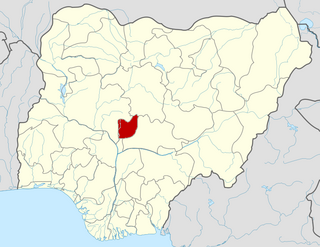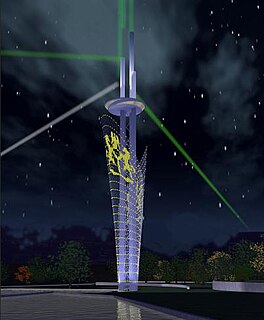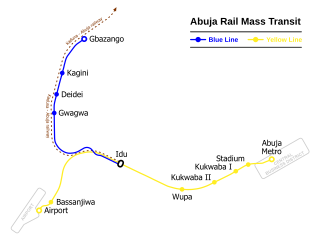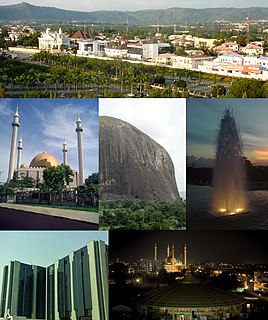A federal district is a type of administrative division of a federation, usually under the direct control of a federal government and organized sometimes with a single municipal body. Federal districts often include capital districts, and they exist in various countries worldwide.

Nnamdi Azikiwe International Airport is an international airport serving Abuja, in the Federal Capital Territory of Nigeria. It is the main airport serving the Nigerian capital city and was named after Nigeria's first President, Nnamdi Azikiwe. The airport is approximately 20 kilometres (12 mi) west of Abuja, and has an international and a domestic terminal that share its single runway.

The Federal Capital Territory, is a federal territory in central Nigeria. Abuja, the capital city of Nigeria, is located in this territory. FCT was formed in 1976 from parts of the states of Nasarawa, Niger and Kogi. It is within the Middle Belt region of the country. Unlike the States of Nigeria, which are headed by elected Governors, it is administered by the Federal Capital Territory Administration, headed by a minister appointed by the President.

Kabba is a town in Kogi State in mid west Nigeria. It lies near the Osse River, at the intersection of roads from Lokoja, Okene, Ogidi, Ado-Ekiti, and Egbe. The town is about 295 kilometers away from Abuja.

The 8th All Africa Games were 5–17 October 2003 in Abuja, Nigeria. 53 countries participated in 23 sports. The main venue was the newly constructed Abuja Stadium. The organizing committee was headed by Nigerian Amos Adamu.

Suleja is a city in Niger State, Nigeria, pop. (2006) local government area, 216,578,
just north of Abuja, capital of the Suleja Emirate. It is sometimes confused with the nearby city of Abuja, due to its proximity, and the fact that it was originally called Abuja before the Nigerian government adopted the name from the then Emir Sulayman Barau for its new federal capital in 1976.
The University of Abuja is a tertiary institution in the Nigerian capital Abuja. It was established on January 1, 1988 as a dual-mode university with the mandate to run conventional and distance learning programmes. Academic work began in the University in 1990 with the matriculation of its pioneer students.
Aliyu Modibbo Umar is a Nigerian technocrat who was the federal Minister of State for Power and Steel from December 2002 to May 2003, Minister of Commerce from July 2006 to July 2007, then Minister for the FCT, a post he held until October 2008.
The Federal Ministry of Education is a part of the Federal Ministries of Nigeria that directs education in Nigeria. It is located at Block 5A, Federal Secretariat Complex, Shehu Shagari Way, Central Area, P.M.B. 146, Garki, Abuja.

The 2009 FIFA U-17 World Cup was the thirteenth tournament of the FIFA U-17 World Cup held in Nigeria from 24 October to 15 November 2009.

Lat. and Long. 09°04′N 07°29′E

The Millennium Tower and Cultural Centre project is one of a number of projects in the Central District of Nigeria's capital city of Abuja. At 170 metres (560 ft), it is the tallest artificial structure in Abuja. The tower was designed by Manfredi Nicoletti and is part of the Nigeria National Complex which also includes the Nigerian Cultural Centre, an eight-storey, low rise, pyramid shaped Cultural Centre. Construction for the tower started in 2006 and was topped out in 2014 whilst the cultural centre is still under construction.
New Nyanya is a town in Nasarawa State. It is a district of Karu Local Government Area, Nasarawa State, and is among the towns that make up the Karu Urban Area, a conurbation of towns stretching into the Federal Capital Territory (FCT). New Nyanya is loosely considered as part of the metropolitan area of Abuja.

Abuja Rail Mass Transit commonly known as Abuja Light Rail is a light rail transport system in Abuja in FCT, Nigeria. It is first rapid transit in the country and in Western Africa and second such system in sub-saharan Africa. The first phase of the project connects the city center to Nnamdi Azikiwe International Airport, stopping at the standard gauge railway station in Idu. The Abuja Metro Line was launched on 12 July 2018 and opened for passengers the following week.
Philips Tanimu Aduda is a Nigerian politician who served two terms in the national House of Representatives between 2003 and 2011, and was elected to the Senate for the Abuja Federal Capital Territory in the 9 April 2011 elections, running on the People's Democratic Party (PDP) ticket.

The Wuse bombing was a terrorist attack on the Emab plaza in Wuse, a district of Abuja, the Federal Capital Territory (FCT) of Nigeria.
École Française d'Abuja Marcel Pagnol is a French international school in Kaura District, Abuja, Nigeria. It serves levels maternelle (preschool) through lycée. As of 2015 the school directly teaches until troisième and uses CNED for seconde and prèmiere ES.

The World Trade Centre is a complex of eight buildings under construction in the Central Business District of Abuja, FCT in Nigeria. There are seven skyscrapers planned for the site, two of which have already been topped out, with the others either under construction or at various stages of development. At 110 m (361 ft), the 24-floor WTC Tower 1, which topped out in 2015 is the tallest residential building in Nigeria, while WTC Tower 2 is the tallest building in Abuja, standing at 120 m (394 ft). Initially scheduled to be opened in 2013, the World Trade Centre Abuja is now scheduled to open in 2016.








